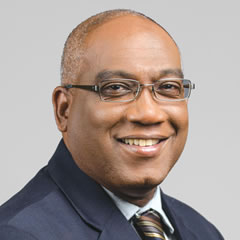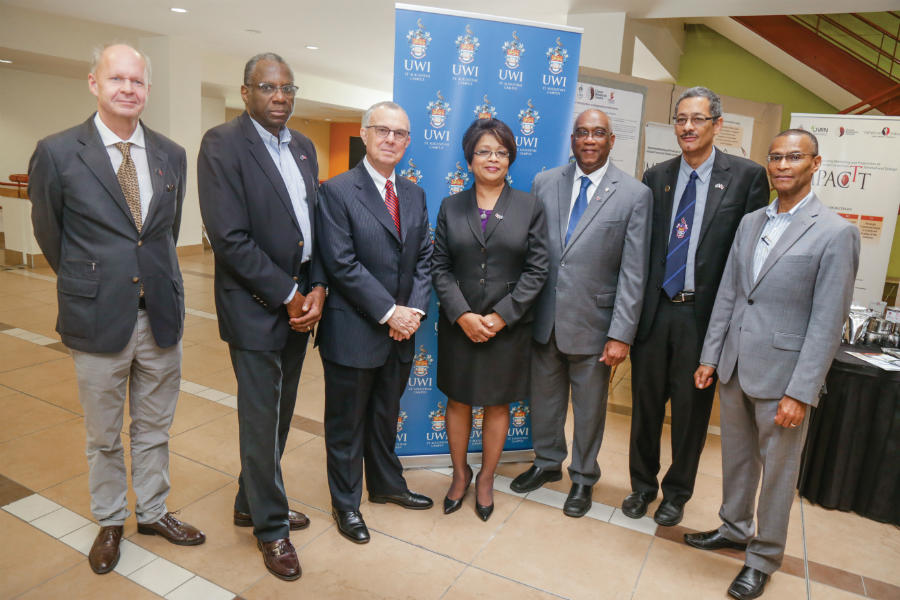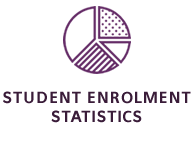It touches on the challenges of the past year and gives a sense of the urgency and diligence we applied in meeting and overcoming them. As such, while this 2016/2017 Annual Report provides the usual coverage of our achievements and a bit of our aspirations, I thought it fit to dedicate this section to the points of introspection that dominated our focus since I assumed the role of Principal at The UWI St. Augustine Campus.
The journey began with a very probing question of why should education be a priority for any nation. Here in the Caribbean, and elsewhere in the world, it is taken for granted that education is a sacrosanct provision, a primary responsibility of governments for their citizens and parents for their children. However, none will doubt the fact that, particularly in economically challenging times, national health, sustenance and security assume a higher priority
than education. The usual thinking, of course, is that education and training are necessary to enable citizens to get meaningful jobs and to provide for the human resource requirements of the nation. While this is absolutely spot-on, we at St. Augustine opine that there is a more fundamental justification for education. This is comprehensively captured in a single word – survival.
From a national perspective, the de facto rationale for education can easily be summarised as empowerment for survival and success (survival at a higher level?) in the job market. This, of course, creates private benefits that include better employment “prospects, higher salaries, and a greater ability to save and invest” (Bloom et al1). However, perhaps more importantly,
it also creates a human capital resource that directs, administers and operates the national job market infrastructure that supports the social, ecological and economic activities that contribute to national survival, well-being and prosperity.
Beyond this, a well-designed national education system must take full cognisance of the nation's future. At the very least, this should involve a deliberate "foresighting" of the world of the future and an assessment of the survival and growth priorities
in the national and regional contexts. From this, the nation would estimate the education and training needs for the labour force of the future and drive the national education system to deliver. Happily, some of this “foresighting” is being done by some institutions such as the International Labour Organisation (ILO), who recently hosted a research consultation session at St. Augustine on the Future of Work in the Caribbean. Prominent in their consideration is the growing
trend of the adoption of automation in production and its impact on the distribution of wealth and the consequent impact on the income gap.
For developing nations to get ahead, efforts
must go beyond education and training to better equip citizens to use new technologies developed elsewhere. Our national education systems must also seek to strengthen the culture of research that leads to export entrepreneurship and innovation. By its very definition, innovation, through the “newness” of what is produced, enhances competitiveness. In our deliberations, we have surmised that there is a need to strengthen the Small and Medium-sized Enterprise (SME) sector so that it contributes much more significantly to the national economy.
In this regard, we have noted the examples of the German Mittlestand and the SME sector in Costa Rica, each of which earns some 30% of the foreign exchange in their respective countries. Tertiary education institutions, because of their stronger emphasis on research and because of their higher level of expertise, should lead in empowering the growth of a Caribbean SME sector that is strongly characterised by export entrepreneurship and innovation. This is a role we see, not just for our graduates but for our staff as well.
The scope of education for survival has a dual dimension that is all too often overlooked. One aspect covers basic survival skills that ensure that citizens can survive when societal support systems collapse as, for example, as a result of a natural or man-made disaster. We do not have to look very far to justify this position. In the past year alone, we have seen the Caribbean suffer from the impact of hurricanes of unprecedented magnitude, we have seen the suffering of the citizens of Venezuela and, only just recently, received news
of the breach of the sea defence systems in Guyana consequent to extraordinarily high levels of tidal activity. Moreover, even over the past few decades, we have witnessed the decline of Caribbean economies and the consequent impact on poverty levels. A 2013 Commonwealth report2 that showed that more than 20% of Trinidad and Tobago are living below the poverty line.
When citizens fall into abject poverty, facing hunger every single day, one wonders if the national education system should not have better prepared them for these eventualities. This is not to say that governments have been unresponsive. For example, not too long ago the Government initiated a programme to teach low-income women basic life- skills. Programmes such as these should be mandatory for all citizens.
The second aspect at this level of survival treats with physical literacy and mental wellness. In 1979 Kolesov and Ponomarev3 spoke of the philosophy of what they called a "physical culture" in the then Soviet Union, which was and still is a powerhouse in sport, and how it "promotes the population's involvement in work
and public life and raises production efficiency." At
the very heart of physical literacy is the individual's knowledge and understanding of body and mind, both embodied in the concept of wellness and in the optimal use of their natural assets—building self- efficacy, and the strengthening of a “physical culture”. This therefore speaks directly to national impact both in physical competence and literacy, public health and wellness, the ability to survive challenging physical circumstances, as well as human development and success in sport. This concept underpins the Campus' philosophy for the St. Augustine Academy of the new Faculty of Sport.



 From left: Dr. Ulrich Thiessen, Programme Manager from the delegation of the European Union to Trinidad and Tobago; Dr. Terrence Farrell, Chair of the Economic Development Advisory Board which co-hosted the Conference; Mr. Robert Bermudez, then Chancellor Designate of The UWI; Ms. Beverly Khan, Deputy Permanent Secretary in the Ministry of Planning and Development (representing the Honourable Minister Camille Robinson-Regis); Professor Brian Copeland; Professor John Agard, Director of the Office of Research Development and Knowledge Transfer, The UWI St. Augustine; and Mr. Ronald Hinds, CEO of Teleios Systems Ltd and new head of the Chamber of Industry and Commerce.
From left: Dr. Ulrich Thiessen, Programme Manager from the delegation of the European Union to Trinidad and Tobago; Dr. Terrence Farrell, Chair of the Economic Development Advisory Board which co-hosted the Conference; Mr. Robert Bermudez, then Chancellor Designate of The UWI; Ms. Beverly Khan, Deputy Permanent Secretary in the Ministry of Planning and Development (representing the Honourable Minister Camille Robinson-Regis); Professor Brian Copeland; Professor John Agard, Director of the Office of Research Development and Knowledge Transfer, The UWI St. Augustine; and Mr. Ronald Hinds, CEO of Teleios Systems Ltd and new head of the Chamber of Industry and Commerce.



